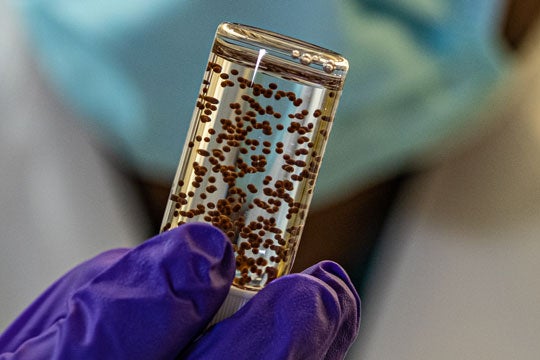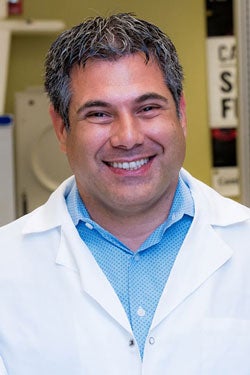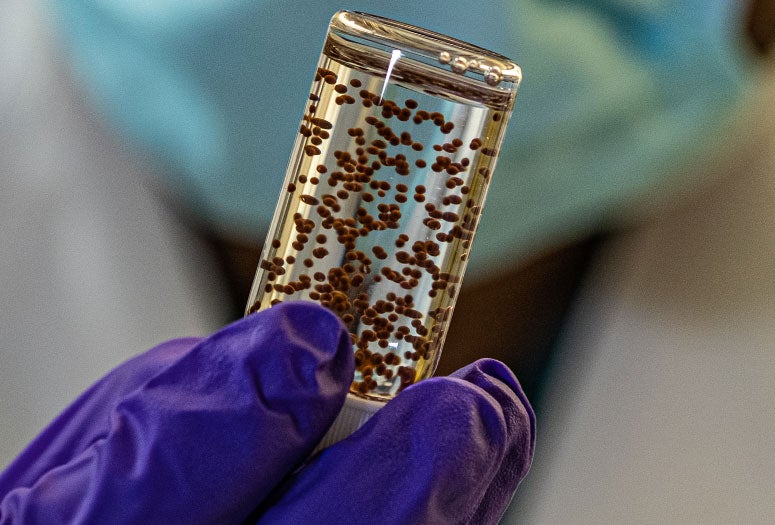HOUSTON – (Aug. 8, 2022) – The inventors of Rice University’s tiny, cancer-killing “drug factory” implants are teaming with surgeons from Baylor College of Medicine to create a version of the technology that can heal injuries caused by heart attacks.

Someone has a heart attack every 40 seconds in the United States. In each, an artery that supplies blood to the heart becomes blocked, and heart muscle tissue dies. In up to 30% of patients, this can lead to a condition called heart failure, where the heart cannot pump with the necessary strength to supply the needs of the body.
Rice and Baylor’s new treatment will target inflammation that can worsen the downward spiral of heart failure.
“In this project, we will engineer cells to produce cytokines that can reduce inflammation and help heal the heart,” said Rice bioengineer Omid Veiseh.
Veiseh is partnering with Baylor cardiothoracic surgeon Ravi Ghanta on the project, which is funded by a grant from the American Heart Association. The cytokine-producing cells will be loaded by the tens of thousands into 1.5-millimeter-wide alginate beads that can be placed directly on the surface of the heart with minimally invasive surgery. The project includes animal testing that could support a future application for a human clinical trial, Veiseh said.


“Once in place, the beads act as ‘drug factories’ that deliver highly localized and concentrated doses of cytokines precisely where they’re needed,” said Ghanta.
Veiseh said the beads will shield the cytokine-producing cells from the immune system and should allow the drug factories to keep working for weeks.
“Our goal is to deliver effective doses of cytokines for up to six months,” Veiseh said.
In a previous study, Ghanta and Veiseh showed beads loaded with stem cells produced 2.5 times greater heart healing in rodents following heart attack than treatment with stem cells unshielded by beads.
Veiseh joined Rice in 2016 thanks to a recruitment grant from the Cancer Prevention and Research Institute of Texas (CPRIT). He has spent years developing encapsulation systems that avoid activating the immune system, and is also using the technology to create treatments for cancer and Type 1 diabetes.
Avenge Bio, a Massachusetts-based startup Veiseh co-founded, this week announced plans to begin a human clinical trial for ovarian cancer later this year. It is the first clinical trial of the “drug factory” technology.
- Image downloads
-
https://news-network.rice.edu/news/files/2022/08/0808_HEARTS-mes760ov-lg.jpeg
CAPTION: Rice University bioengineer Omid Veiseh invented bead-like implants to deliver highly localized and concentrated doses of cytokines and is partnering with colleagues at Baylor College of Medicine to create a version of the implants that can heal heart muscle damage caused by heart attacks. (Photo by Jeff Fitlow/Rice University)https://news-network.rice.edu/news/files/2022/08/0808_HEARTS-rg-lg.jpg
CAPTION: Ravi Ghanta is a cardiothoracic surgeon at Baylor College of Medicine and chief of cardiac surgery at Houston's Ben Taub Hospital. (Photo courtesy of Baylor College of Medicine)https://news-network.rice.edu/news/files/2022/08/0808_HEARTS-10317B-lg.jpeg
CAPTION: Tiny alginate bead implants invented in the laboratory of Rice University bioengineer Omid Veiseh can be loaded with cells that produce cytokines, proteins that play a major role in immune response. The bead implants act as “drug factories” that deliver highly localized, highly concentrated doses of cytokines. Veiseh and collaborators at Baylor College of Medicine are developing versions of the 1.5-millimeter-wide implants that could heal heart muscle injuries caused by heart attacks. (Photo by Jeff Fitlow/Rice University) - Related stories
-
Rice lab’s ‘drug factory’ implants cleared for human trials – Aug. 3, 2022
https://news.rice.edu/news/2022/rice-labs-drug-factory-implants-cleared-human-trials‘Drug factory’ implants eliminate ovarian, colorectal cancer in mice – March 2, 2022
https://news.rice.edu/news/2022/drug-factory-implants-eliminate-ovarian-colorectal-cancer-miceRice team creating insulin-producing implant for Type 1 diabetes – July 26, 2021
https://news.rice.edu/news/2021/rice-team-creating-insulin-producing-implant-type-1-diabetesHeart attack damage reduced by shielded stem cells – Aug. 18, 2020
https://news.rice.edu/news/2020/heart-attack-damage-reduced-shielded-stem-cells - Links
-
Veiseh lab: http://veisehlab.rice.edu/
Laboratory for Cardiac Regeneration: https://www.bcm.edu/departments/surgery/research/laboratory-for-cardiac-regeneration
Baylor College of Medicine News: https://www.bcm.edu/news
Rice Bioengineering: https://bioengineering.rice.edu/
Rice’s George R. Brown School of Engineering: https://engineering.rice.edu/
- About Rice
-
Located on a 300-acre forested campus in Houston, Rice University is consistently ranked among the nation’s top 20 universities by U.S. News & World Report. Rice has highly respected schools of Architecture, Business, Continuing Studies, Engineering, Humanities, Music, Natural Sciences and Social Sciences and is home to the Baker Institute for Public Policy. With 4,240 undergraduates and 3,972 graduate students, Rice’s undergraduate student-to-faculty ratio is just under 6-to-1. Its residential college system builds close-knit communities and lifelong friendships, just one reason why Rice is ranked No. 1 for lots of race/class interaction and No. 1 for quality of life by the Princeton Review. Rice is also rated as a best value among private universities by Kiplinger’s Personal Finance.

